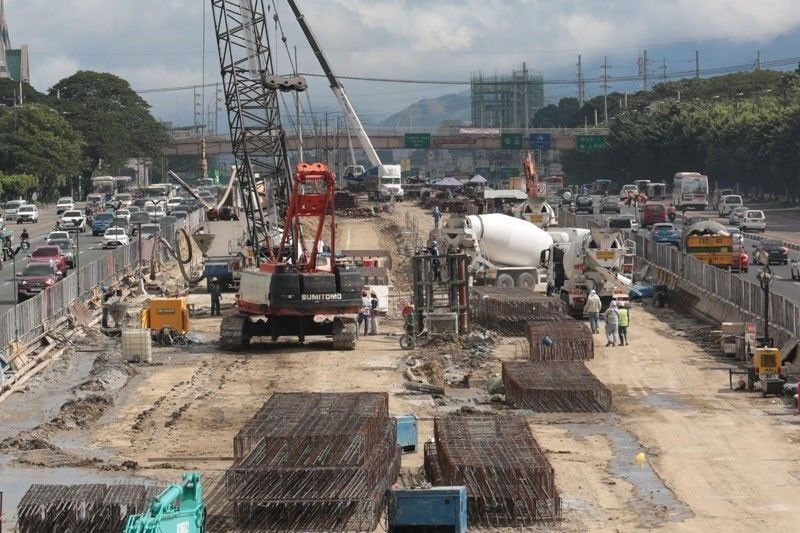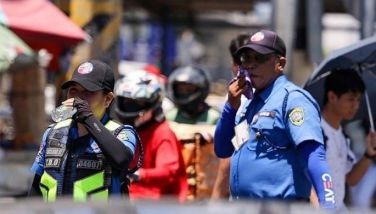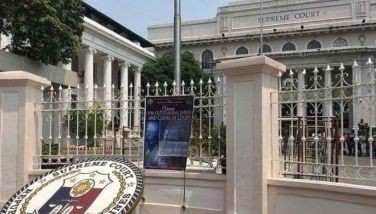DOTr questions credibility of Ateneo experts' warning vs 'high-risk' infra projects

MANILA, Philippines — Despite the recommendations outlined by experts in a research paper amid the coronavirus pandemic, the transportation department still believes the Duterte administration's flagship Build, Build, Build program and its big-ticket infrastructure projects can usher in a promised "golden age" of infrastructure in the Philippines.
In a statement sent to Philstar.com, the Department of Transportation said that theAteneo Center for Economic Research and Development paper was 'short-sighted' and failed to take into account the long existing need for infrastructure in the country.
The working paper, titled “Overhauling Land Transportation in the New Normal and Beyond,” argued that while the government’s infrastructure program is a critical area for spending with economic recovery efforts, some of its projects could suffer from social distancing over the construction period, which would only hamper the possibility of completion within the current administration.
Pointing to what it said was the "authors’ misunderstanding of the government’s investment decision making process," the department said in its statement: "The proponents of [the projects] are in the best position to assess the viabilities of their investments, not the 'Ateneo Experts.' Especially for unsolicited, since they don't have government guarantees. It's money in the proponents' pockets that are at stake and not money from pockets of 'Ateneo Experts'."
In their paper, economists Jedd Ugay, Monica Lavares, Jerik Cruz and Marjorie Muyrong cited railway projects, among others, that would prove to be unsustainable should the coronavirus pandemic extend and urged the government to “redesign the BBB portfolio of projects to adapt to the ‘new normal.’”
“Public resources that are and will be allocated to such projects can instead be used to fund more inclusive road transport investments as well as COVID-related spending,” the Ateneo authors said.
“It is advisable for the Duterte administration to focus further on providing sustainable road and active transport to the public through more inclusive, low-cost, and economically-viable systems,” they also wrote.
'Short-sighted'
But the DOTr saw it differently, saying: "While operating railways are admittedly more expensive that operating other modes of land transport, the much higher capacity or the number of people that railways can carry is what justifies their higher cost of investment and operations." The department did not include any figures to corroborate this claim.
In a text message, transportation spokesperson Goddes Libiran added that the paper — which the department called the "unvetted Ugay paper" — failed to take into account the pressing need for the overdue infrastructure projects and the "robust multi-level and multi-agency review process" that they went through.
"When we evaluate the economic returns of our big-ticket infra investments, we look at a 40-year horizon. Are they saying that a one-year event will negate all the economic benefit of the investment over a 40-year period?" she said.
"Also, we don’t start paying for our loans until after 12 years. People have forgotten COVID-19, all our projects are running, we have not paid our ODA loans yet. Also, it takes years to develop and build big ticket infra projects. If we do not do it now, when? Shouldn't it have been done 20-30 years ago? What they want is for it to push back again," she also said.
Libiran also sent the overall completion rates of the rail projects as of June 30:
- Common Station - 44.36%
- LRT 2 West Extension - 7.42%
- Metro Manila Subway Project - 17.26%
- MRT-3 Rehabilitation Project - 49.12%
- MRT-4 Ongoing finalization of TOR for Design Consultants
- LRT 2 East Extension - 90.17%
- Mindanao Railway - 7.50%
- Subic-Clark Railway Project (SCRP) - 10.5%
Asked what the department's preparations would be should the pandemic exceed one year, Libiran said: "They will still push through, as they are now, subject to health protocols."
Forced evictions
But for the time being, work has resumed on a number of projects under the program and has led to demolitions and forced evictions despite the ongoing coronavirus pandemic, leaving at least 25 families already homeless in a quarantine where police have been encouraged to "have no qualms" arresting violators.
LOOK: Over 100 residents of Brgy. Dos in Cabuyao, Laguna whose homes were demolished pen a letter to Mayor Mel Gecolea, Laguna Gov. Ramil Hernandez and Laguna 2nd District Rep. Ruth Hernandez asking to be spared from the battery of evictions linked to PNR Southrail @PhilstarNews pic.twitter.com/LPz5lfdeBM
— Franco Luna (@francoIuna) July 24, 2020
Academics have said that government agencies benefit from the popular imaging of the poor as lazy and dirty enemies of progress that is also usually favorable to big businesses as demolition projects are in turn framed as necessary for 'economic development,' 'urbanization', 'infrastructural projects' and similar language.
READ: Urban poor face evictions even as pandemic requires them to stay at home
They also said in an earlier story by Philstar.com that the government routinely makes use of such "developmentalist vocabulary" in justifying demolition projects and displacing informal settlers.
"Should COVID-19 social distancing measures be required for the foreseeable future, tremendous subsidies may be required to keep such railways commercially afloat. Along with debt payments for foreign-funded projects, these subsidies could thus ‘crowd out’ domestic public resources which could otherwise be allocated for pandemic-related investments," the Ateneo paper said.
- Latest
- Trending




































